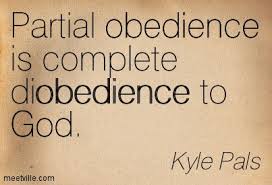So, what have we learned about obedience?
According to Webster, obedience is defined as submission to authority. Operating with that definition, our natural response is to challenge, resist, and even disavow.
On the other hand, obedience from a Christian worldview is more than just following the letter of the law. It is discerning what God wants and choosing to seek that outcome. In the Old Testament, the Hebrew word for obey means to hear.
It is described as an attitude and faith-rooted disposition (2 Cor. 2:9; Phil. 2:12). It is the outward response of the heart that hears God and turns to Him.
Where does obedience come from?
Obedience is evidence of a personal relationship with God. It is not motivated by guilt or shame but by love (John 14:15). We agreed last week that mature obedience is both the outcome of our faith walk AND how we can achieve spiritual maturity. Each time we make a decision or choose a direction, or reply to an action, we are challenged to “response with a heart that hears God”.
Jesus our example
The writer of Hebrews offers us another perspective on obedience—perfected obedience.
Though He [Jesus] was a Son, yet He learned obedience by the things which He suffered. And having been perfected, He became the author of eternal salvation to all who obey Him. Hebrew 5:8-9 (NKJV)
Our text gives us a clue into how our obedience becomes “perfected”. It begins and ends with a clear understanding of Jesus and His walk of perfected obedience.
Firstly, Jesus never sinned. Jesus had no need to become perfect for His work of salvation. Jesus was perfect in His nature (1 Pet. 2:22; Heb. 4:15). Imagine that! Even as a rambunctious child, a growing teenager, and a vibrant young man—Jesus never sinned. No defiance, no hiding behind excuses. To fulfill God’s requirement for a “blameless sacrifice for sin” (1 Pet. 1:19), Jesus suffered and was obedient unto death (Phil. 2:8).
Secondly, Jesus learned. What did He learn? Jesus learned what it meant to be human by experiencing all the emotions and sensations that we as frail humans feel. Why? So that He could identify with our depravity and brokenness.
Jesus willingly experienced the full range of emotions He had placed in us at Creation (Heb. 4:25). Jesus was moved with compassion (Matt. 9:36; Mark 6:34); He cried (Luke 19:41, John 11:35); He withdrew (Matt. 14:13); Jesus condemned (Matt. 23:1-12).
But it is in Jesus’ passion that we see the greatest evidence of humanity. In the Garden of Gethsemane, He was in excruciating agony, sweating drops of blood (Luke 22:42; Mark 14:36). Ultimately, Jesus bore the full weight of our sins by hanging on a Cross and dying. (Matt. 27:50)
Jesus was perfected
Finally, Jesus was perfected. The literal translation of perfected is “to bring to an end a proposed goal”. Jesus accomplished the purpose crafted by God before the foundation of the world—to bring redemption, restoration, and reconciliation to all mankind. Jesus became the “all and everything” that was needed to bring salvation to fallen man.
Jesus learned about humanity and why His sacrificial death was the only solution for the sin problem. He became “the author of eternal salvation” (Heb. 5:9), the “firstborn among many brethren” (Romans 8:29), and the “first-begotten from the dead” (Rev. 1:5).
Jesus’ perfecting was accomplished through His obedience. Jesus’ submission to and love for God resulted in the greatest gift we as believers will ever receive—freedom from sin and eternal life. To put into words the enormity of God’s plan of salvation is impossible.
Perfected obedience—a new level of love and gratitude
I close with these words from F.B. Meyer on “The Perfecting of Christ”. May his words move your spirit to new levels of obedience.
For the long and steep ascent of life, our Father has given us a Companion, a Captain of the march, a Brother, even Jesus our Lord, who passed through the suffering of death, and is now crowned with glory and honor (Heb. 2:9-11). He has passed along our pathway, and climbed our steep ascents, that He might become our merciful and faithful Friend and Helper. In this sense He was perfected, and became unto all them that obey Him the Author of eternal salvation. But if we are to walk with Him, and realize His eternal salvation, we must learn to obey.
Understanding perfected obedience is captured in the life and love of Jesus the Christ. Jesus is our model and the example we daily strive to emulate. Let us endeavor, by the power of the Holy Spirit, to be conformed to His image and ultimately transformed into all that God has purposed us to be (Eph. 2:10).










